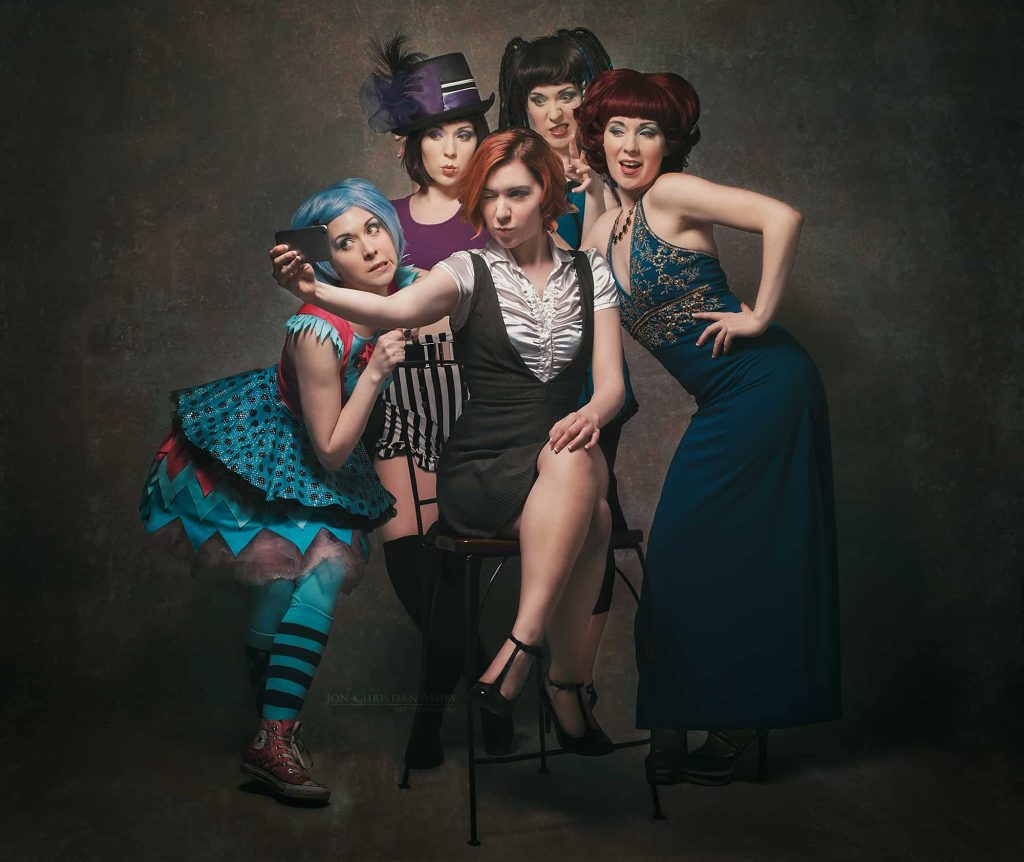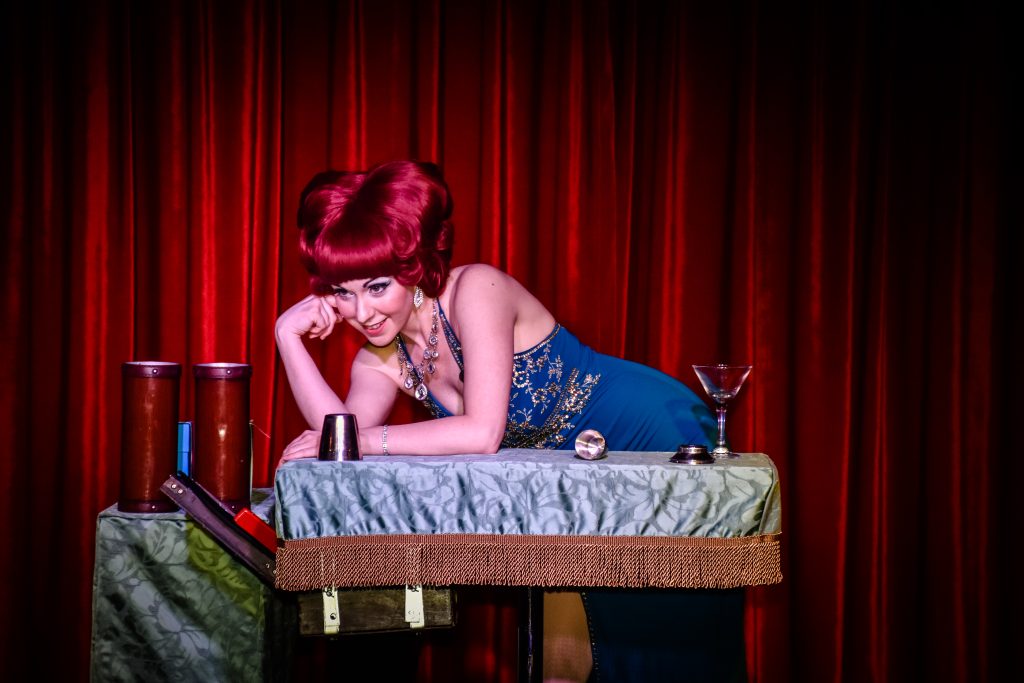Creating Characters with Carisa Hendrix: A Lucy Darling Story

Lucy Darling is a world-renowned socialite whose dazzling stage magic and improvisational comedy will be gracing Theatre Kingston next weekend.
While Ms. Darling was much too busy to meet me for an interview—and, really, can you blame her? She has places to be!—I recently had the opportunity to speak with Carisa Hendrix, the performer and magician behind the persona. After a delightful potation of Lucy Darling YouTube content, I met with Hendrix over Zoom, where we spoke about their inspirations, the character creation process, and what Lucy has in store for us later this month.
This interview has been edited for length and clarity.
Watching you play Lucy Darling, I’m struck by how she embodies this old-fashioned femininity—calling back to a very assertive, almost Mae West-like character. When I think of magicians, there’s this stereotypical image of a man onstage and his lovely assistant off to the side. The lovely magician you’ve created with Lucy is a really neat subversion. How did you conceive of this character, and how have you found playing her to different rooms?
I love screwball comedies. I love Mae West, Zsa Zsa Gabor, Eartha Kitt, all these people. Watching these movies was my favourite hobby, it was what I did to calm down and relax. I loved the voice and I loved everything about it. So I thought, okay, this could be a fun idea.
Everybody talked me out of it, because it was not the way I’d normally created characters. It wasn’t purpose-built, there was no material for her. Then I took a class with Rob Zabrecky, who is a character magician, at a magic convention. He was so generous with his attention about what I wanted to do, and this little bit of encouragement moved the needle forward.
Three weeks later, I was at the Edmonton Fringe Festival, hanging out with another magician, Nick Nicholas. He’s quite a boisterous, say-it-like-it-is kind of guy. I told him about this thing I wanted to work on, and he goes, “No, you don’t. You don’t care. You don’t want to work on it.” I was like, what are you talking about? He’s like, “Listen, there’s this magic festival in Australia that happens every July. If you’re there next year doing this character, I’ll know you’re serious. But right now, it’s just words.”
So I said, screw you, and it went from this fun idea that I probably would have just let wander around in my head to, I booked the festival. I booked the flights. I hired [accent coach] David LaReaney, and we built this really specific idiolect.
When I learned that Zsa Zsa Gabor had died, it really affected me. A lot of times when we see powerful femininity in the media now, it’s coded as masculine. She had that incredible, subversive energy that’s powerful and feminine at the same time. Powerful, brilliant, and deeply, deeply female. I’m a non-binary person, so this exploration of gender has always been really interesting to me. When she died, I felt this really deep longing, like this idea that the thing I love so much, it’s properly gone now. There was kind of this call to action that was like, I refuse to let this completely go from the universe—if it means it’s got to live inside me, then it will.
I wrote it with my wife at the time. It was a duo show, and she was two big, goofy drag characters. We show up in Australia, we’re overtired, and the marriage hasn’t been going that well. I think a lot of straight people in this situation would have a baby to save the relationship. But we wrote a show. We did the show once the way I wrote it. Then we had a big fight and she left. So now I’m in Australia, with nine more shows, and half the material. And I’m a decent improviser. So Lucy became an improvised show. I improvised what I didn’t have, and it won the Comedy Award, it got extended, and I got hired at the Magic Castle afterward.
I’d never gotten recognition like that for anything I’d ever created before. It was such a great education, because it really forces the character to become very real when you improvise in character.

On Penn & Teller: Fool Us, you mentioned that the characters you play bring out a different kind of strength and confidence for you. What have you been learning from Lucy in the past seven years?
It is really interesting playing characters, because you realize that the way you’re perceived is, in many ways, very much within your control. Even early on, doing characters gave me a great sense of power. I am a very focused person—I just want to talk about magic and comedy all day—and over the years, I found myself feeling socially isolated. With characters, everything is a performance. Gender is a performance. In a way, personality is a performance. It’s all kind of a show.
Originally, I created a lot of very low status, unlikable characters. I was trying to be okay with not being liked. To be in somebody else’s body and practice the idea that I’m just not going to be for everybody. It’s funny—people really enjoy finding people annoying. So I would do this big stilt-walking bird character and I would squawk at kids, and deliberately be the worst.
When I played Lucy for the first time, I wanted them to go, “I love her.” Early on, that was a challenge. She was a lot sweeter in the first show. Now, she’s a little more combative. There’s this great book by John Truby called The Anatomy of Story—he talks about how a likable character is not necessarily kind. They have goals and objectives and motivations we completely understand, that you might like to let yourself have. So I love the idea that Lucy’s goals are very transparent. What she wants is very clear, and it looks like it’d be really fun to be her.
It’s been such a great opportunity to play at being deeply loved and getting used to that feeling… I can have all these personality quirks and it’s safe—it’s safe to be those people. So then when I am being my real self, it’s easier to let myself be whatever’s coming out that day, because I know those are all safe things to be.
What does Lucy Darling have to say about coming to Kingston?
She is very excited! The way we work on new material together, it’s very much like the Ship of Theseus. So we’re bringing Indulgence, however, almost half of it is new. It’s stuff I am so overwhelmingly proud of, and so excited for Lucy to do. Kingston is a knowledgeable theatre town that’s going to appreciate some more advanced improv choices and some cleverness. Sometimes I work in resort towns and cruise ships—and I love it, it’s great—but you can’t put in as much art.
You guys are getting a show most people don’t get, and it’s the show I’m the most proud of, and [Lucy] gets to be the most unhinged… Every show is going to be a singular experience because it’s so heavily improvised that, after that night is done, that show will never exist again.
Carisa Hendrix is an award-winning comedy entertainer and magician best known for the persona Lucy Darling.
Theatre Kingston presents ‘Lucy Darling in Indulgence’ at the Tett Centre Rehearsal Hall on July 20th, 2024, at 7pm and 9pm. Tickets and more information can be found here.